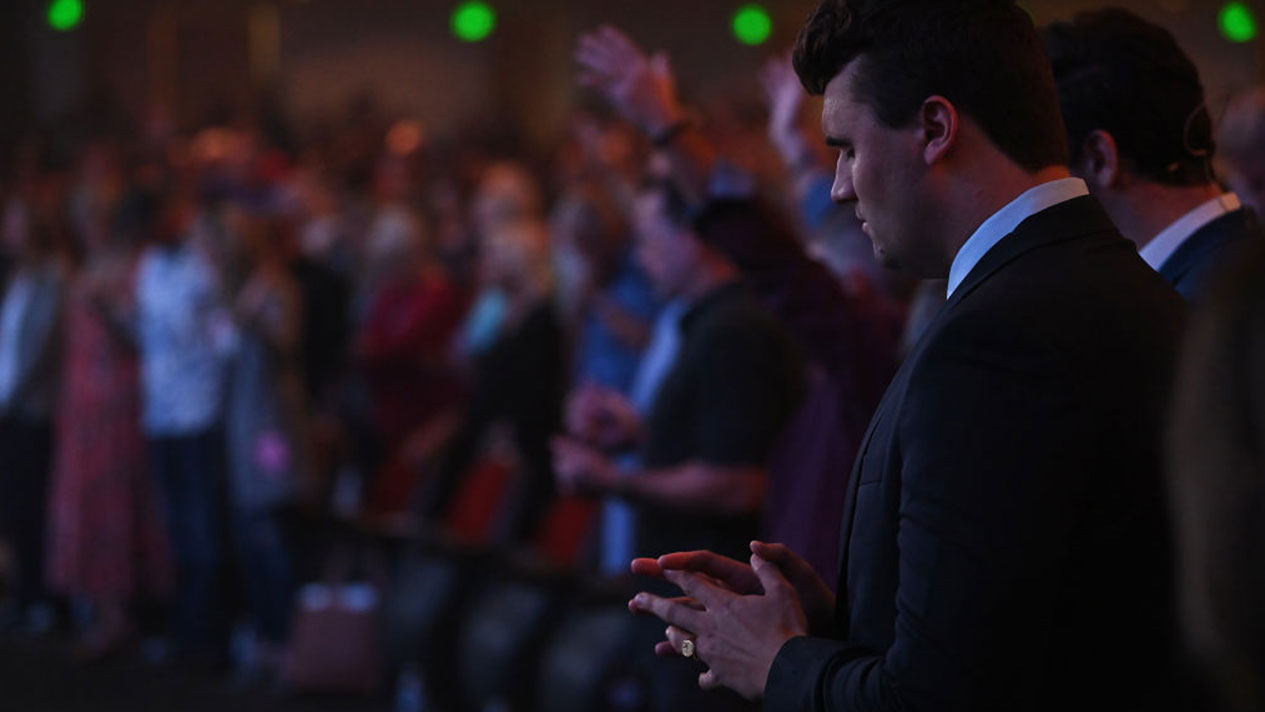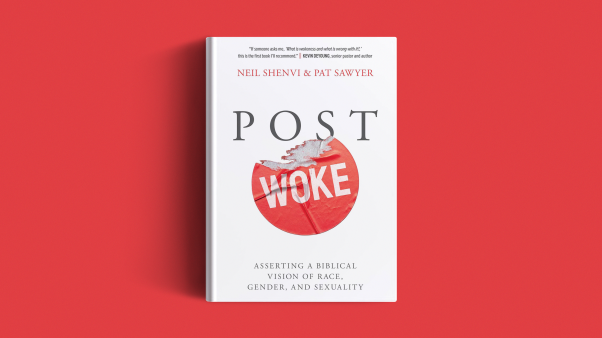I was waiting for my lunch appointment to arrive when I saw the video on X. In my gut, I knew Charlie Kirk was going to die. The brutality—and grim clarity—of the clip made my heart drop. My first thought: His wife. His Kids.
My second thought: My congregation.
What do they need? How many will be heartbroken? How many will be haunted by the clips that are circulating? How many have no idea who he was? How many loved him? How many didn’t like him? What should our pastors and staff do? How should we prepare them?
Then my heart returned to the cold facts: Charlie Kirk—husband, father, friend, conservative activist, and brother in Christ—had been assassinated.
For many, myself included, he was a bold witness—unashamed of the gospel of Jesus Christ and willing to champion countercultural truths, whether by advocating for the unborn or upholding a Christian vision of marriage and sexuality. To others, his brash style and controversial remarks made him hard to hear. Some saw a prophetic voice; others saw a provocateur. Some saw a man growing in grace and maturity; others saw a culture warrior who played too close to the edge.
As pastors, we carry the weight of shepherding people who often see these things very differently. Some in our churches admired Kirk’s courage. Others were concerned by his tone. Most feel confused, grieved, or simply weary by the continued fracturing of our world. But no matter how we perceived him, we now face a discipleship question: How do we shepherd our people faithfully in the wake of such a moment?
In the second century, when reflecting on the unjust and unprovoked killing of Christians, Tertullian wrote, “[Christians] are not a new philosophy but a divine revelation. That’s why you can’t just exterminate us; the more you kill the more we are. The blood of the martyrs is the seed of the church.” What do we do with that seed when it falls not in the arena, but in the age of algorithms, outrage, and moral confusion? What are we called to plant, and what fruit do we hope to see?
Consider these five questions that may help us as pastors—first to reflect personally, and then to shepherd our congregations in how we respond to this tragic act of evil.
Who gets to narrate the world?
God rules the whole universe; his perspective on history is ultimate, final, and perfect.
Robert Webber’s book Who Get’s to Narrate the World? argues that the Christian story is true—not just as a personal opinion among many, but a divine revelation that sits over and against the postmodern assumption that all worldviews are equally plausible. This basic evangelical perspective also reminds us that there is no such thing as secular neutrality.
People who do not know, love, and follow Jesus cannot fully account for what was done to Kirk. If you let “the fool says in his heart, “There is no God’” (Psalm 14:1) describe and narrate to you what is unfolding, you will lose touch with reality, because they are already out of touch with it. To follow Jesus is live soberly within the grain of the Creator’s story. As in The Chronicles of Narnia, the narrative offered by the White Witch cannot make sense of the fact that Aslan is on the move. We will be discipled by someone’s story; the secular humanist account of the world is not just different, it is insufficient—and wrong.
I’ll offer one simple example out of the many that have emerged in the hours after Kirk’s murder. Before he was even officially pronounced dead, an MSNBC commentator said, “You can’t have awful thoughts and say awful things and not expect awful actions.” We don’t know exactly which of Kirk’s comments he was referencing. But many evangelical Christians hear those words as an attack on their own basic Christian beliefs—a biblical view of marriage, saying abortion is murder, believing that a woman is an adult human female, and confessing that salvation is found only in Jesus Christ.
Why label basic evangelical beliefs as “awful”? Perhaps to shame believers into silence. To suggest that speaking biblical truth incites violence is to place the blame in the wrong place. Awe-filled reverence for the Lord of all is not awful. What is awful is the judgment of God against those who set themselves against him.
Whom shall I send?
The primary way we honor Charlie Kirk’s legacy is to be like him—to walk unashamed of the gospel of Jesus Christ, to say what we believe, to speak plainly, and to do so even in environments hostile to the authority of God.
Too often, many of us are content to delegate evangelism to evangelists, preaching to preachers, and truth-speaking to pundits while comfortably sitting in the shadows of those who risk their reputations and relationships. We may not be policymakers in the Capitol or elders in our congregations, but we are nonetheless the missionary people of God, the light to the nations, and the image bearers of God who bear incredible responsibility.
In Isaiah 6, the question God asks the prophet should ring in our ears, not just the ears of prophets and public figures: “Whom shall I send? And who will go for us?”
And our right response ought to echo Isaiah’s, “Here Am I, Send me!”
We are sent ones, every one of us sent to our neighborhoods, institutions, families, and friends to announce the good news of the reign of God in history through the death and resurrection of Jesus. We are ambassadors—God making his appeal through us—who do our best to defend the young and vulnerable from sub-Christian, murderous, and oppressive ideologies.
Is Jesus Lord of all?
You do not have to agree with every detail of how Charlie Kirk attempted to integrate his faith with his politics, but you must agree that one’s faith cannot be separated from one’s politics. There are many Christians who didn’t like what Kirk was doing. Brash. Not winsome enough. Argumentative. Too political. Some who critique Kirk may do so out of genuine concern for over his tone or method. Others, however, are tempted to retreat into a private faith that never risks public witness.
But the call of Christ presses us to move beyond either silence or cynicism—to bring our whole selves, including our convictions, into the open. If you want hits, you must swing at pitches. And when you swing, you’ll sometimes miss. But some Christians swing at nothing—content to sit in the dugout, then stand at a distance and criticize those who are in the game.
Notice how one of his political (not personal) opponents, Ezra Klein at The New York Times, described him after his passing:
“Kirk was practicing politics in exactly the right way. He was showing up to campuses and talking with anyone who would talk to him. He was one of the era’s most effective practitioners of persuasion…Kirk and I were on different sides of most political arguments. We were on the same side on the continued possibility of American politics.”
May we conduct ourselves in such a manner that even our opponents see our integrity, consistency, and our commitment to right means—not just right ends.
If Jesus is Lord of all, then it follows that his instruction and social teaching are good for all. We must “seek the peace and prosperity of the city to which I have carried you into exile” (Jer. 29:7), and the ground and standard of that peace and prosperity is God’s word.
Submission to and respect for the Ten Commandments would have helped here: “You shall not murder” is a command we can no longer take for granted (Exodus 20:13). A recent report from Network Contagion Research Institute found that 55% of “left of center” people think assassinating Donald Trump would be “somewhat justified.” Include all the surveys respondents, regardless of political leaning, and it is still at 38%. The brokenness we’re witnessing is not random. It reveals how sick we are as a nation.
Will I love my enemies?
Can I bless those who persecute me? Will I not revile when reviled? Will I turn the other cheek? Will I love my enemies? If I can’t, then I’m living in contradiction to God’s law.
Ephesians 6:12 a verse Christians are too slow to believe: “For our struggle is not against flesh and blood, but against the rulers, against the authorities, against the powers of this dark world and against the spiritual forces of evil in the heavenly realms.” The image bearers on “the other side” of the aisle or the issue at hand are not the enemy. They may be held captive by human tradition and demonic influence, but they are not our ultimate enemies. If we cannot walk in step with the fruit of the Spirit, we too have been taken captive by the spirit of the age.
The collective rage at the killing of Charlie Kirk is understandable. But often, that rage shields something deeper: our grief. The world is not as it should be. People are not as they should be. The government is not as it should be. The government, the media, and even we—Christ followers—are not as we should be.
The suffering and decay we see around us are the fruit of sin and demonic power in a broken and fallen world. Our capacity to push back on the darkness is frustratingly limited. We pray, preach, disciple, advocate, and labor toward the things of God. Yet the myth of progress—that modern belief that humanity is steadily improving and can save itself—is shattered time and time again.
In that place of discouragement, the temptation to act sinfully in response to sin is real—to match outrage for outrage, or to harden into cynicism. But we’re called to react; we’re called to endure. We’re called to cling to holiness—not through gritted teeth, but by staying rooted in Christ, walking by the Spirit, and obeying God’s Word, even when it costs us. Not because it’s easy, but because that’s what faithfulness looks like in the dark.
What should I do next?
Yesterday, and today, I felt shepherded by Charlie Kirk’s own words:
“When things are moving very fast and people are losing their minds, it’s important to stay grounded. Turn off your phone, read scripture, spend time with friends.”
That’s not just personal advice. It’s pastoral guidance. And it’s needed now more than ever.
In these reactionary times, we must be the ones who remain rooted. Grounded. Present. We must immerse ourselves in the visible people of God. Cling to God in Christ. And then lead others to do the same.
Do today what Charlie Kirk cannot: Hug your spouse, hold your kids, invest in your local church, and call a friend who is struggling.
And do today what Charlie Kirk is doing now: Praise the risen Lord, pray to the Father, and immerse yourself in the life of the Spirit.
“The blood of the martyrs is the seed of the church.”
May his death not make us shrink back in fear, but stand up in faith. Preach clearly. Shepherd faithfully. And lead your people to live holy lives in the midst of a crooked generation—the kind of lives that bear fruit from the seeds he planted.
Seth Troutt is the teaching pastor at Ironwood Church in Arizona. His doctoral studies focused on Gen Z, digitization, and bodily self-concept. He writes about emotions, gender, parenting, and the intersection of theology and culture. Seth and his wife, Taylor, have two young children.









